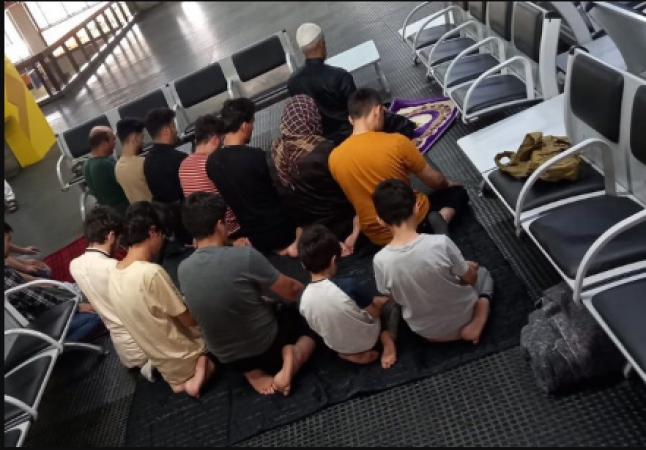
Saopaulo: A group of 150 Afghan refugees who recently arrived in Brazil did not have a happy Eid Al-Adha this year.
They were forced to spend the most significant Muslim holiday in a makeshift camp at the airport's terminal while dealing with poor food and sanitation conditions as well as an outbreak of scabies.
Thousands of Afghans have been entering the South American nation, one of the few places in the world issuing humanitarian visas for them, to escape persecution by the Taliban, which took over Kabul in August 2021.
More than 7,000 people have come so far.
However, because Brazil lacks a programme to receive refugees, many of them arrive at the airport in Sao Paulo without a place to stay in their new nation. In 2021, a temporary camp was erected at the terminal, where waves of Afghans would stay for up to four weeks before moving on to other accommodations.
The federal government, local governments, and nongovernmental organisations were able to send all refugees to shelters and empty the terminal earlier this year. But as more groups continued to arrive, a new camp was established. More than 200 refugees were camped out at the terminal at the start of June.
They have been receiving hot meals from the local government, and aid organisations also offer assistance. But the issues are numerous, ranging from a lack of access to regular bathing to inadequate meal portions.
Aline Sobral, a Muslim activist who has been assisting the refugees in the airport since the crisis began, claimed to Arab News a few weeks ago that the government sent pork sausages in the hot meals given to them.
There are many difficulties faced by Afghans in Brazil, but recent weeks have been particularly difficult. At the terminal, the number of refugees kept increasing but no assistance was given. The first scabies cases were documented at that time. In addition to some kids, more than 20 people were impacted.
"Eid Al-Adha is a significant date for us, and Muslims continue to worship Allah despite hardships. We worshipped Allah even though there was no special food in the airport, Sobral said.
Afghan refugee Shabir Ahmad Niazi, who arrived in Brazil seven months ago, was at the terminal on June 28 with his fellow citizens. He spent a month at the camp when he first arrived in Brazil seven months ago, so he is very familiar with the suffering they are going through.
Also Read: Iran's Nour News dismisses an Israeli report that an Iranian agent was captured
"Since we didn't have any special food or presents to give to the refugees, we were unable to organise a proper Eid Al-Adha celebration. We merely prayed, chatted briefly, and gave each other hugs," he told Arab News.
Niazi founded the Afghanistan Refugee Rescue Organisation, which has been working to find solutions for the issues facing the Afghan refugees in Brazil, along with his brother and a few friends.
People are sick and tired of that. They have experienced psychological difficulty. Being separated from their families and unsure of when they will see them again is very upsetting, particularly around a holiday, he said.
People in Afghanistan would visit their relatives, dress in new clothes, and share a special meal to celebrate Eid Al-Adha. Niazi and other activists attempted to arrange a visit to a mosque here in Brazil, but they were unsuccessful.
"I played with the kids and gave them candy. Despite all of their issues, we wanted to see them happy, he said.
On that unique day, Sobral's husband, Sheikh Hosnir Badawi, was asked to conduct the prayers. However, he was worried about the terminal's hygienic conditions.
In Islam, we cannot incite a gathering of people if we are aware that a disease is present. So I advised them to maintain a safe distance between one another while they were praying," he told Arab News.
Badawi claimed that "given that people were sad and dejected," only a small portion of the refugees who were camped out at the time of the prayer.
Some of them also feel unclean because they have trouble taking showers. Others refrain from praying in public out of concern that Brazilians might react negatively, he added, explaining to the refugees that religious freedom in Brazil is guaranteed by the country's constitution.
Following the relocation of all refugees to a shelter in the coastal city of Praia Grande, the camp was once again cleared just two days later.
Authorities acted after hearing about the scabies outbreak in the media, but many people, including Badawi, worry that the camp will reappear.
"Afghans will continue to arrive, and there is no programme to adequately welcome them," he declared.
Shabir Niazi visited Brasilia last week and spoke with officials there about the refugee crisis. In the hopes of receiving funding from the government to carry out his First Shelter project, he described it in detail.
Also Read: Pope meets with Julian Assange's wife and family, and he expresses concern for his suffering
"My idea is to set up a temporary shelter for all Afghans who come to Brazil, a place where they can be taught about Brazilian culture and receive lessons in Portuguese," he said, adding that the recently arrived must be made aware of the dangers of human trafficking, a growing issue among them.
"They don't know that human traffickers might take advantage of them when they arrive in Brazil. To deal with the refugees, we need a sufficient system like that; otherwise, issues will continue to arise.